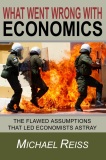Even if God himself came down and magically cured the Greece problem then we'd simply be having a Portugal crisis a few months down the line. If it wasn't for Portugal it would be Italy, if it wasn't for Italy it would be Spain. The list goes on and on and ultimately includes the UK and the US.
The problem lies with fractional reserve banking and the ability of banks to create money for non productive purposes like trading shares on margin. In our current fractional reserve monetary system, the idea is that money gets created and destroyed at approximately equal rates. But if there is a lack of enthusiasm for trading on margin then the money supply starts shrinking and share prices fall. The normal trick of lowering interest rates to encourage more trading on margin can not work right now, so we are on a one way ticket to a shrinking money supply and lower share prices and lower house prices. This should bankrupt most banks, but it seems that governments can't bear for this to happen. Instead they will tax the poor and donate that money to the bankers to keep them afloat. At some point the poor will get fed up and take to the streets - the sooner the better I say.
For years I have been telling people that the crash of 2007 was the hors d'oeuvre, you'd better brace yourself for the main course.
Saturday, 24 September 2011
Subscribe to:
Post Comments (Atom)




Personally I think fractional reserve should be banned. I would put the main flaw in it slightly differently. It’s main flaw is that it is pro-cyclical. E.g. the money for ramping up shares prior to 1929 came from “thin air” money produced by commercial banks. Same goes for house price appreciation prior to the recent credit crunch.
ReplyDeleteRe the shrinking money supply, Samuel Brittan in the FT yesterday said it had shrunk by 15% in real terms in the last 3 years or so. See:
http://www.ft.com/cms/s/0/74258ef0-e3a8-11e0-bd3d-00144feabdc0.html#axzz1YrdEq5gf
I don't understand this idea that Fractional Reserve creates and destroy equal amounts of money. In the US the money supply was $300 Billion in 1971 and exploded at an increasing rate to $15+ Trillion today. All that money was created as DEBT by FRB. Usually when people claim FRB doesn't really create money it's to defend it, but either way, its' not true.
ReplyDeleteThe real mind boggler is how people talk endlessly about the supposed reasons for the debt crisis - when the answer is so obvious - creating exponentially increasing amounts of debt/money has no other possible outcome.
I said "approximately equal", not exactly equal. It is the difference between the rate of creation and destruction that corresponds to the expansion of the money supply.
ReplyDeleteTJ, It is not correct to say that the FRB creates money as debt. When a COMMERCIAL bank creates a dollar of money, it creates a dollar of debt at the same time. And that is REAL debt. I.e. if the relevant debtor does not pay up on time, they can be sued and their assets grabbed.
ReplyDeleteIn the case of central banks there is an OSTENSIBLE debt: a $100 bill is ostensibly a debt owed by the FRB to the holder of the bill. And on British £20 notes it says “I (governor of the Bank of England) promise to pay the bearer the sum of £20”. But that is meaningless. If you go along to the Bank of England and demand £20 worth of gold or anything else for your £20 note, you’ll be told to shove off.